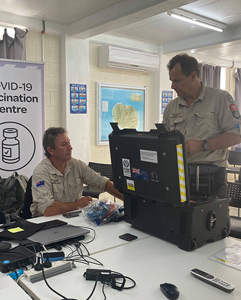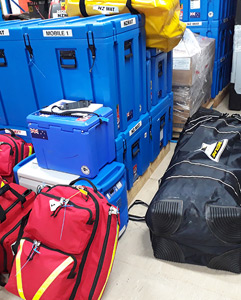The Ministry of Health has the authority to deploy a New Zealand Medical Assistance Team (NZMAT) following a request from Te Whatu Ora (for domestic deployments) or the Ministry of Foreign Affairs and Trade (for offshore deployments usually in the south-west Pacific).
 NZMAT will provide medical support to the local population by integrating and engaging with local structures or by providing a self-sufficient capability.
NZMAT will provide medical support to the local population by integrating and engaging with local structures or by providing a self-sufficient capability.
Decision on NZMAT deployment
The decision whether to deploy NZMAT will depend on the following factors:
- request by the affected region or government for assistance
- request by the Ministry of Foreign Affairs and Trade for assistance
- health needs in the affected area
- ability of the environment to support the response
- access to the affected area
- security situation
- local capacity to respond to the emergency (government and other organisations)
- critical infrastructure to support the response
- local health services capacity: public health, primary, secondary and tertiary services
- avoiding duplication of services or resources
- magnitude and evolution of the emergency
- consistency with services normally provided in that area
- current demands on the New Zealand Health and Disability System.
During a deployment
During a deployment the Ministry of Health will provide the operational base support for NZMAT. The Ministry will coordinate the overall national health response and liaise with Te Whatu Ora and the lead New Zealand government agency (ie, the National Emergency Management Agency or MFAT) as required.
During a domestic emergency event NZMAT will not replace the wide-ranging support from the health sector to the affected region. NZMAT may be deployed as part of this wider support and this will be coordinated within existing emergency management structures.
NZMAT personnel deployed in response to a disaster will have numerous skills, and will be able and willing to work in a variety of settings including in the community or in existing or temporary health facilities. The composition of the team may change over the period of the deployment to meet the changing demands of the situation.
Most NZMAT deployments will depart from Auckland where team personnel will be briefed and issued appropriate uniform and personal equipment.
 Deployment overview
Deployment overview
Notice of NZMAT deployment
The Ministry of Health will decide whether an NZMAT should be deployed or put on standby in any situation. Potential team personnel will be selected from a database of trained personnel, based on the identified skills and mission requirements.
Trained personnel may be needed at any time, day or night, so will be required to provide 24/7 contact details. It is the responsibility of NZMAT personnel to keep their information on NZMAT’s personnel database (D4H) up-to-date and with the NZMAT Programme Manager.
Advance warning of deployment
On average, NZMAT personnel receive 1–7 days warning of a deployment. However, in extreme circumstance, there may be only 4–8 hours.
As the situation may change rapidly and other international emergency medical teams may be deployed into the affected area, last minute changes may be made to the team make-up. NZMAT personnel must therefore be prepared to be flexible, and to wait for new instructions if required.
If the Ministry believes a situation may require health support from outside the affected area, an NZMAT response may be put on stand-by as a contingency in advance of any formal requests from the affected area.
Note: NZMAT does not deploy unless a formal request for medical assistance has been received by the Ministry of Foreign Affairs and Trade.
Accepting deployment
Participation on a NZMAT deployment is on a voluntary basis. NZMAT personnel can accept or decline any given request for deployment participation – it is your decision. If you accept a deployment, it is expected that you have prior approval from your employer to be released from your work responsibilities and that you will go (ie, you will not pull out at the last minute – except in exceptional situations – as this can put the NZMAT deployment in jeopardy).
Keep in mind that participating in an emergency response can:
- be physically and emotionally draining
- separate you from your family for extended periods of time
- involve an element of managed risk
Work responsibilities
It is the deploying person’s responsibility to make all arrangements with their employer (including obtaining permission to deploy) before accepting an offer to participate on an assignment from NZMAT. The person should discuss possible deployment with their employer prior to deployment.
Family responsibilities
It is the deploying person’s responsibility to make arrangements for childcare and other personal needs before accepting an offer to participate on an NZMAT deployment.
